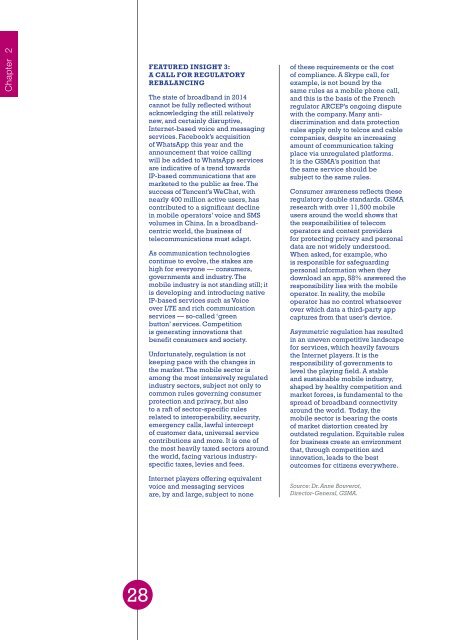DI8xz
DI8xz
DI8xz
Create successful ePaper yourself
Turn your PDF publications into a flip-book with our unique Google optimized e-Paper software.
Chapter 2Featured Insight 3:A Call for RegulatoryRebalancingThe state of broadband in 2014cannot be fully reflected withoutacknowledging the still relativelynew, and certainly disruptive,Internet-based voice and messagingservices. Facebook’s acquisitionof WhatsApp this year and theannouncement that voice callingwill be added to WhatsApp servicesare indicative of a trend towardsIP-based communications that aremarketed to the public as free. Thesuccess of Tencent’s WeChat, withnearly 400 million active users, hascontributed to a significant declinein mobile operators’ voice and SMSvolumes in China. In a broadbandcentricworld, the business oftelecommunications must adapt.As communication technologiescontinue to evolve, the stakes arehigh for everyone — consumers,governments and industry. Themobile industry is not standing still; itis developing and introducing nativeIP-based services such as Voiceover LTE and rich communicationservices — so-called ‘greenbutton’ services. Competitionis generating innovations thatbenefit consumers and society.Unfortunately, regulation is notkeeping pace with the changes inthe market. The mobile sector isamong the most intensively regulatedindustry sectors, subject not only tocommon rules governing consumerprotection and privacy, but alsoto a raft of sector-specific rulesrelated to interoperability, security,emergency calls, lawful interceptof customer data, universal servicecontributions and more. It is one ofthe most heavily taxed sectors aroundthe world, facing various industryspecifictaxes, levies and fees.Internet players offering equivalentvoice and messaging servicesare, by and large, subject to noneof these requirements or the costof compliance. A Skype call, forexample, is not bound by thesame rules as a mobile phone call,and this is the basis of the Frenchregulator ARCEP’s ongoing disputewith the company. Many antidiscriminationand data protectionrules apply only to telcos and cablecompanies, despite an increasingamount of communication takingplace via unregulated platforms.It is the GSMA’s position thatthe same service should besubject to the same rules.Consumer awareness reflects theseregulatory double standards. GSMAresearch with over 11,500 mobileusers around the world shows thatthe responsibilities of telecomoperators and content providersfor protecting privacy and personaldata are not widely understood.When asked, for example, whois responsible for safeguardingpersonal information when theydownload an app, 58% answered theresponsibility lies with the mobileoperator. In reality, the mobileoperator has no control whatsoeverover which data a third-party appcaptures from that user’s device.Asymmetric regulation has resultedin an uneven competitive landscapefor services, which heavily favoursthe Internet players. It is theresponsibility of governments tolevel the playing field. A stableand sustainable mobile industry,shaped by healthy competition andmarket forces, is fundamental to thespread of broadband connectivityaround the world. Today, themobile sector is bearing the costsof market distortion created byoutdated regulation. Equitable rulesfor business create an environmentthat, through competition andinnovation, leads to the bestoutcomes for citizens everywhere.Source: Dr. Anne Bouverot,Director-General, GSMA.28


